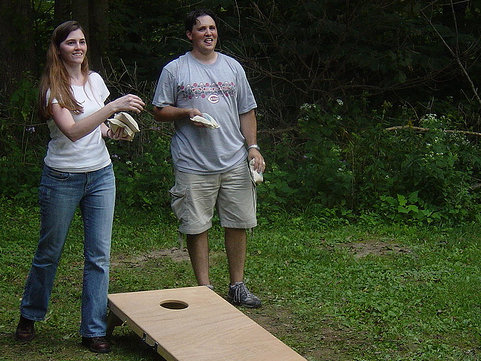Infiltrating Miller Park, street festivals and hometown barbeques, the typical cornhole player holds a bag in one hand and a beer in the other. Relaxed play for friendly competition doubled with local bragging rights, cornhole replaces cards as the newest interactive drinking experience.
However, the American Cornhole Organization (ACO) is tossing around more than just the casual tourney.
Calculated rules, high end equipment and an intense stroke of competition make up one half of the American Cornhole Organization's version. On the other hand, Rich Clague and local organizers urge you just to get out, toss a few rounds and feel the addiction.
Striving to introduce cornhole in all 50 states and provide players with the latest in equipment, rule policy and general information, the American Cornhole Organization undertook the task of transforming the casual outdoor game into a cultural phenomenon.
Aptly heeding the ACO's desires, cornhole suddenly exploded onto outdoor gatherings of both kids and adults alike. Simultaneously, the activity jumped into the world of competitive sport, arranging tournaments around the country to culminate in an annual World Championship and donning a national "King of Cornhole."
Whether on the casual or competitive track, the overall concept is pretty much the same. Consisting of two opposing boards with circular cut outs, the game is conceptually a modified combination of horse shoes and skiball. Tossing bean filled bags onto a wooden platform, the goal is to land bags into cut out holes and earn points.
At least that's the short version.
OnMilwaukee.com recently chatted with Rich Clague, the American Cornhole Organization's Wisconsin representative to talk shucker, hanger and jumper and get an expert suggestion on throwing the toss.
OnMilwaukee.com: How did you get involved with the American Cornhole Organization?
Rich Clague: "I got in touch with Frank Geers, the major owner of ACO products, years ago and just sought out how I could become more involved both with spreading the game and informing people about the professional equipment."
OMC: Have you personally been playing cornhole for a long time?
RC: This started off as kind of a hobby with some of the neighbors on homemade equipment and we started talking about who else might be out there playing or if there was any standardized playing procedure. What I found was that ACO is the most official governing body for cornhole working with the most professional equipment. It's still something we do for fun and we take seriously on some levels, but it's also just a fun thing to do.
OMC: Where does ACO fall in terms of treating cornhole as an official sport versus casual game?
RC: ACO just wants to give people the opportunity for some sort of standard in the game. It doesn't mean it's frowned upon to use your own stuff and make your own stuff; it's all good for the sport. But we meet people who want to know where they rank in the big scheme of things and ACO provides that opportunity. The best part is coming across people who just want to try it out and want a chance to play.
OMC: What makes a professional cornhole player?
RC: I would say there are, and this is just a ballpark figure, but by ACO testing standards, there are 50-75 people that would be considered pro level. It's pretty much determined by having taking a specified number of shots and making a certain amount. There are probably plenty of people who play on their own who we never see or hear from who would certainly fall into that class.
RC: It's sort of in its infancy in Milwaukee. You'll see it at a Brewers game or tailgate but there isn't the understanding here like there is specifically in Ohio. We've set up a winter league at Fanatics the last couple of winters to get more people playing. We've done what we can to spread the knowledge and information.
OMC: You're having a tournament this weekend?
RC: For about three years, we've done a local thing with our neighborhood. We've got around 100 people including families and kids; we'll have several tournaments for doubles, kids, ladies and men. There are some people who take it a little more seriously but in the end it's really a block party.
OMC: Why do you think cornhole has gained such a wide popularity so quickly?
RC: It's a fun, laid back sport that pretty much anyone can get into. You can pick it up pretty quickly and be good at it. We know people who take it to work during the lunch hour or bring it out at family barbeques. It's one of those things that doesn't take much space and is pretty safe and fun.
OMC: What's your best tip for people just starting to play the game?
RC: Obviously the more you practice, the easier it'll come. The common mistake people make is thinking they've got the bag in the hole. Focus on consistency rather than perfection. Even after playing for so many years, I remind myself all the time.
OnMilwaukee.com staff writer Maureen Post grew up in Wauwatosa. A lover of international and urban culture, Maureen received a bachelor’s degree in sociology from the University of Wisconsin-Madison.
After living on the east side of Madison for several years, Maureen returned to Milwaukee in 2006.
After a brief stint of travel, Maureen joined OnMilwaukee.com as the city’s oldest intern and has been hooked ever since. Combining her three key infatuations, Milwaukee’s great music, incredible food and inspiring art (and yes, in that order), Maureen’s job just about fits her perfectly.
Residing in Bay View, Maureen vehemently believes the city can become fresh and new with a simple move across town.



